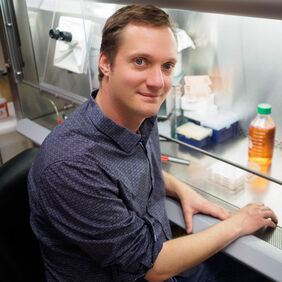The focus of Hockemeyer's research group is on establishing genetically engineered human and mouse stem cell systems to model human diseases and the aging process. The team utilizes expertise’s in telomere biology, stem cell biology and genome editing. A key research goal is to uncover the mechanisms of tumorigenesis in humans and identify vulnerabilities that can be addressed in the development of new cancer therapeutics.
While mouse models of cancer have provided important insights into fundamental mechanisms, critical differences in tumor biology between mice and humans have hindered the translation of these findings into successful therapeutics. For example, reactivation of telomerase (a nuclear enzyme that restores the end pieces of chromosomes, called telomeres) is a key feature of tumor formation in human cells but not in mouse cells.
To address this problem, Hockemeyer's lab has engineered primary human cell systems to elucidate the early events in tumorigenesis and to study the mechanisms of telomerase regulation during stem cell maintenance, differentiation, and immortalization.
Dirk Hockemeyer will present recently published as well as unpublished data on his team's efforts to use CRISPR-mediated mutagenesis to systematically investigate how abnormal telomere shortening promotes cancer and how premature telomere shortening leads to tissue failure.
Dirk Hockemeyer is Associate Professor of Cell Biology, Development and Physiology in the Department of Molecular & Cell Biology at the and a research group leader in . The goal of his team is to explore the key functions of telomeres and telomerase in tissue homeostasis, tumorigenesis and aging.
| Title of Talk: | Elucidating the mechanisms of cellular immortality |
| When: | Thursday, November 09, 2023, 3:00 pm |
| Where: | Seminar room “Nucleus”, main building (FLI 1), Beutenbergstraße 11, Jena |
| Host: | Alfred Nordheim (Scientific Director FLI) |
The colloquium will be a hybrid event. Details for accessing the session will be provided before the colloquium takes place. For external guests: Please contact Ivonne.Roeppnack-Jahnke@~@leibniz-fli.de for details.









